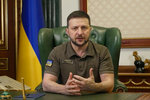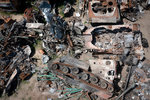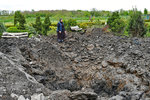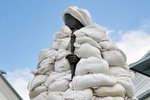




ZAPORIZHZHIA, Ukraine (AP) — Ukraine stopped the flow of Russian natural gas through one hub that feeds European homes and industry on Wednesday, while a pro-Kremlin official in a southern region seized by Russian troops said it would ask Moscow to annex it.
The remarks could be another sign of Russia’s broader plan for Ukraine as it tries to salvage an invasion that has so far gone awry — amid concerns that the country may remain a source of continental and global instability for months, or even years, to come.
After his forces failed to quickly overrun the capital, President Vladimir Putin shifted his focus to the country’s eastern heartland of the Donbas. But one of his commanders has suggested that Moscow's plans are broader, saying it also hopes to take control of the country’s south and cut it off from the coast.
“The city of Kherson is Russia,” Kirill Stremousov, deputy head of the regional administration installed by Moscow, told Russia’s RIA Novosti news agency. He said regional officials wanted to make Kherson a “proper region” of Russia.
Russian-installed authorities don’t always speak for Moscow, but last month, Stremousov ruled out returning control of the Kherson region to Ukrainian authorities.
Kherson borders Crimea, which Russia annexed in 2014, and its capture was one of Russia's most important successes in the war.
In 11 weeks, the war has played out on battlefields in Ukrainian towns and cities but also in energy and financial markets, as Ukraine's allies in the West have sought to deprive Russia of money needed to fund the war with sanctions and energy embargoes.
The immediate practical impact of Wednesday's gas cutoff was likely to be limited since much of the gas can be directed through another pipeline, gas analyst Zongqiang Luo at Rystad Energy said.
Preliminary flow data suggested that was already happening, though Russia’s state-owned giant Gazprom indicated some drop in supply. It said it was sending gas supplies to Europe through Ukraine in the amount of 72 million cubic meters, apparently down 25% from the day before.
The move highlights the broader risk to gas supplies in the war and holds symbolic significance as the first time Ukraine has disrupted the flow westward.
“Yesterday’s decision is a small preview of what might happen if gas installations are hit by live fire and face the risk of extended downtimes,” Luo said.
He added that the interruption would also make it harder for European countries to refill underground storage for next winter and would “hasten Europe’s plans to move away from imports of Russian gas.”
The European Union has sought to reduce its dependence on Russian energy, phasing out its use of coal and considering doing the same for oil. Gas presents a more complicated problem, given both how much Europe uses and the technical difficulties in sourcing it elsewhere.
It was not clear if Russia would take any immediate hit, since it has long-term contracts and other ways of transporting gas.
Ukraine's natural gas pipeline operator said it would stop Russian shipments through a hub in a part of eastern Ukraine controlled by Moscow-backed separatists because of interference from “occupying forces,” including the apparent siphoning of gas. It also complained about interference along the route last month.
Benchmark European gas futures seesawed Tuesday and Wednesday on the news, meaning consumers may face higher energy bills — at a time of already rising prices.
Higher prices would benefit Russia, though it has massive foreign reserves now thanks to the rapid rise in crude oil prices in recent months as global travel and business resumed in the wake of mass coronavirus pandemic lockdowns.
The hub in question handles about a third of Russian gas passing through Ukraine to Western Europe. Russia’s state-owned natural gas giant Gazprom put the figure at about a quarter.
The move came as Western powers have been looking to ratchet up economic pressure on Moscow and bolster Ukraine's defenders. The U.S. House of Representatives approved a $40 billion Ukraine aid package Tuesday.
U.S. officials and NATO have expressed concerns that Russia may be digging in for a protracted conflict as the war grinds into its third month with little sign of a decisive military victory for either side and no resolution in sight.
The Atlantic alliance is also waiting to see whether Sweden and Finland, two key Baltic Sea neighbors of Russia, would announce plans to join NATO — in what could be a serious blow to Russia.
___
Gambrell reported from Lviv, Ukraine. Yesica Fisch in Bakhmut, David Keyton in Kyiv, Yuras Karmanau in Lviv, Mstyslav Chernov in Kharkiv, Lolita C. Baldor in Washington, Kelvin Chan in London and AP's worldwide staff contributed.